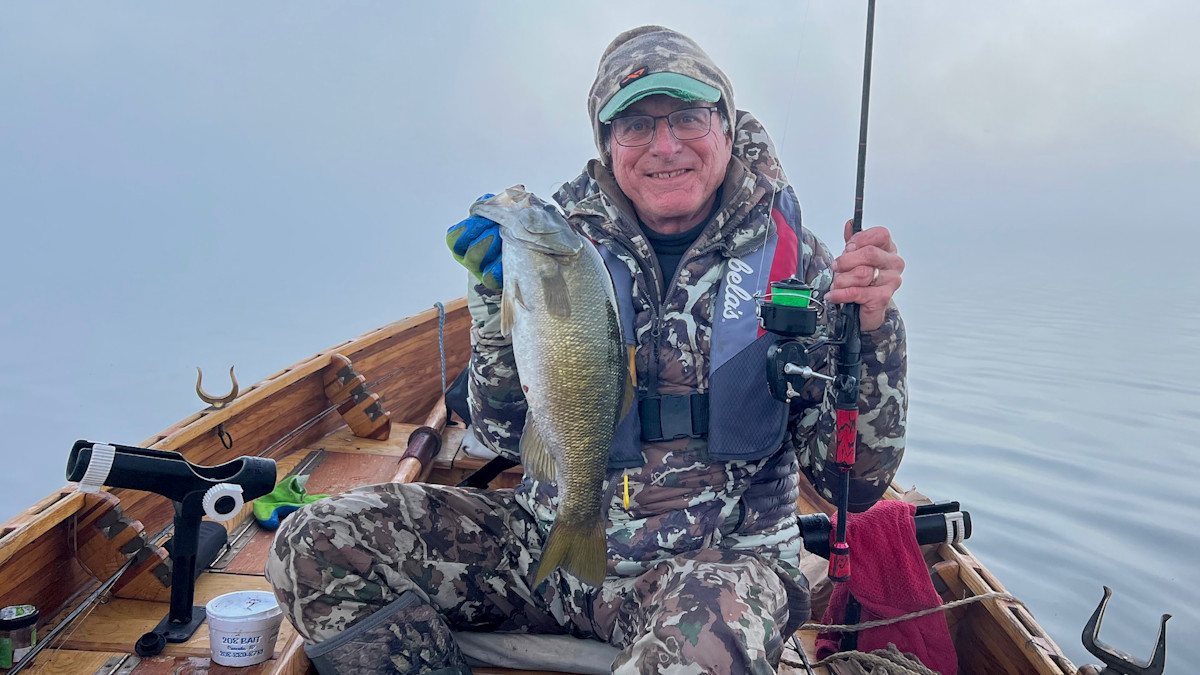
A small fleet of fishing boats ranging from one-person kayaks to low-slung, rocket-propelled bass boats squeezed me from my preferred hole on a recent Sunday while fishing Idaho’s Lake Cascade.
Rather than stress and feel aggrieved, I pulled anchor and rowed my cedar-strip rowboat 200 yards northward before dropping anchor again. The nearest anglers were a father and daughter fishing from huge sandstone rocks on the shoreline 75 yards away.
Around lunchtime, I pulled my stringer aboard and counted 12 perch; three of them 12 to 13 inches long and built like smallmouth bass.
When that fishing hole failed early Monday, I rowed back to the site I abandoned the day before. My friend in Cascade, Chris Weber—a former Wisconsin resident—now guides perch anglers full-time on the big reservoir. He suggested I try that spot and a few others within rowing distance of my campsite, and suggested I cast a blade-bait lure, which I dubbed the "Weber Blade," since he helped design it.
“Cast it out, let it sink to the bottom with a tight line, and then work it back, twitching and reeling it,” he said, making the motions with an imaginary spinning rod.
The fishing improved slightly after my move, but after I unhooked and released several undersize perch, the action died by 9 a.m. The slowdown gave me time to survey the few boats nearby. Three were 12- to 14-foot aluminum fishing boats with tiller-control engines. The other craft was a traditional Western double-bow drift boat.
Including my cedar-stripper, all these boats had one thing in common: Their owners and passengers were all old guys. Four of us fished alone from small boats, and two were trolling from the drift boat while a third stroked the oars.
You’d expect old guys to outnumber younger anglers on a weekday, given the assumption that most seniors are retired and have more free time. But how many of us geezers typically fish alone? I’ve never kept track or seen research on the question, but are old-timers more apt to fish alone than folks in other age groups? Is that stereotype from “Grumpy Old Men” correct, that even if old guys know each other and fish the same lake, they prefer to fish from their own boats or ice shanties?
Anecdotally, it would seem so. Some friends tell me they struggle to be useful at boat launches. They’re more likely to slip and fall on wet rocks or cement, or risk a heart attack if asked to crank the winch.
Others say they can no longer climb into or out of boats unless it has pontoons and a flat deck. Even then, once on deck, some say they feel too wobbly to leave their seat.
Those factors aren’t surprising. Evidence of such problems show up in annual reports of boating fatalities, whether compiled by the U.S. Coast Guard or state fish and wildlife agencies. The reports detail old guys often drowning after falling from boats while hauling up anchors, yanking engine-starter ropes, manually tilting small engines up or down, or losing their balance and falling off the transom while answering nature’s call.
Sadly, despite feeling less spry in their boats, few of those old guys were wearing a lifejacket.
Not to sound judgmental, but the only old guys I saw wearing lifejackets on Lake Cascade that day were the three men row-trolling for trout in the drift boat. As I watched one old guy tottering back and forth in his 14-foot aluminum boat, squeezing past his large dog every time he raised or lowered his bow-mounted trolling motor, I half-expected him to topple in.
Still, most old-timers I hear from prefer fishing alone simply because they can’t find compatible fishing buddies. They usually go after specific fish in specific waters while using particular baits and preferred techniques. Some dislike electronics, others hate trolling, and still others only want to fish near home for two or three hours in the morning or evening.
No doubt, sharing the same fishing boat requires well-matched preferences and temperaments. A few lucky guys married women who enjoy fishing and let their husbands be the guide and captain. Either that, or the wives or girlfriends don’t trust their man to wear his lifejacket or follow boat-launch etiquette when fishing alone, so they come along to ensure compliance.
Again, though, most fishing wives aren’t fools. They can distinguish stupid from stalwart.
For instance, while camped near Lake Cascade’s shoreline one day to avoid a steady rain, I looked out the tent flap to watch lone old guys occasionally trolling past for trout or casting for perch. One guy putted along in his old fishing boat with an aging Johnson outboard, dragging one lure behind a handheld rod. Despite the rain and 50-degree temperatures, he wore only a ball cap, light jacket, and everyday pants. His only heat source, as far as I could tell, was the cigarette clenched between his lips.
Who can’t admire such tenacity? And we can understand the choice to go solo. By fishing alone, he didn’t have to worry about someone quitting on him and forcing him to go home. Some anglers press on undaunted when fish don’t bite, despite endless casting, location changes, fresh bait, or new lures.
Imprisoning a friend on your boat or inside your ice shanty when it makes more sense to go home tests their pluck. But it often ensures you’ll fish alone next time, no matter how fast the fish start biting.
It seems that old guys willingly put their friends and family to such tests.






